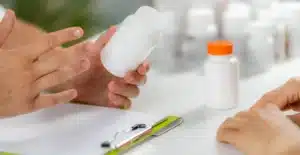Is Your Spouse Addicted to Prescription Drugs?
One of the fastest growing forms of addiction in the United States is prescription drug addiction. The number of Americans who were treated for addiction to prescription pain relievers quadrupled between 1998 and 2008. A large increase in the number of emergency room visits due to overdose of opiate prescription drugs has led the Centers for Disease Control and Prevention to call for urgent action. The number of visits to the emergency room related to oxycodone abuse increased by more than 150 percent in only five years. According to the National Institute on Drug Abuse, 6.2 million people age 12 and older reported using prescription drugs for non-medical purposes within a month prior to the study performed in 2011.
If any of these drugs sound familiar to you and you’ve been taking them or other opiate prescription drugs by means other than prescribed, you may be suffering from addiction. Those with substance abuse problems typically administer these drugs through chewing, snorting or injecting them. They often purchase the drugs through a less than ethical pharmacy and frequently refer to them by street names such as “Vikes,” “Oxys,” “Percs,” or “Ds”.
If it is your spouse you are concerned about, you may ask,” How do I know if my wife is a drug addict?” Physicians state that the following behaviors may be indicative of drug abuse:
• Recurrent Refills: your husband or wife obtains refills of the prescription even though they are not experiencing physical pain.
• Medication Supply Exhausted Prematurely: individuals who are addicted to pain relievers often take larger doses of the medication than prescribed.
• Alcohol and Marijuana Consumption: the addition of other substances may suggest that the individual has no control of their drug use.
• Fatigue: those who take larger doses of pain relievers will appear overly sedated. When used as prescribed, the sedative effects of these drugs diminish with time.
These are signs that a physician will recognize. How are you supposed to know if your spouse is in pain or if they’re refilling prescriptions too often? Chances are that if asked, they’ll deny it whether it’s the truth or not. And you may still ask, “Is my husband on drugs?” Those who have dealt with a spouse engaged in substance abuse point to the following:
• He or she make talk too fast: While addicts are typically perceived as unkempt individuals teetering on the edge of consciousness, prescription opiates have been known to speed up a person’s speech and compel a typically shy person to be outgoing. Addiction to opiates is common among women who use pain relievers to help them get through tedious household chores or manage social events that require them to be extroverted when they’re normal demeanor is shy.
• Your spouse may have trouble sitting through meals. Opiates deplete a person’s appetite, not only for food, but for art, music, companionship and sex. Opiates are more effective on an empty stomach. Those that chew them may often leave the table to use them prior to a meal. They will frequently pick at their food or keep leaving the table.
• Your sex life may be suffering. Pain relievers often inhibit the libido. Your spouse may no longer desire sex or be capable of an orgasm. Drugs that interfere with the sleep cycle such as Valium and Xanax may produce this effect.
• He or she may have unexplained bruises. Benzodiazepines and opiates interfere with balance and allay pain. They may often bump into furniture without realizing it.
• Your spouse may hide medications. They may be overly protective of their purse or have places in the home they don’t want you to go.
Northbound Treatment Services has a nationally recognized and award winning addiction recovery program. Northbound offers a variety of residential and outpatient treatment programs to help patients through the recovery process while remaining productive in society. They understand that no two individuals are the same and offer customized treatment plans to meet each patient’s needs.
Author
-

President, CEO & Founder at Northbound Treatment Network
Paul Alexander is the CEO, President & Founder of Northbound Treatment Network in Newport Beach, California. He believes wholeheartedly in transformational leadership, organizational health and effective, fully integrated substance use disorder and mental health treatment. With over 27 years of experience in behavioral healthcare, Paul has extensive knowledge of “in vivo” treatment modalities, clinical development, operations, strategy, marketing and financial planning. He has been widely recognized for his development of collegiate-based residential treatment programs for students in recovery and authored a research study at The University of California confirming this modality’s effectiveness.
Paul’s comprehensive professional experience, willingness to innovate, and emphasis on organizational health are vital factors in Northbound’s continued success. Paul received his Certified Addiction Treatment Specialist training at Saddleback College in Mission Viejo, CA, and was awarded Outstanding Alumni Service Award in 2002. Paul holds a Bachelor of Arts degree in Criminology, Law and Society, Summa Cum Laude, from University of California, Irvine, and a Juris Doctorate degree from Loyola Law School of Los Angeles. Paul currently serves on The National Association of Addiction Treatment Providers (NAATP) board. In addition, he serves on The Family Recovery Foundation board and The CarePossible board in Orange County; both organizations are committed to raising funds for family recovery and treatment for former military personnel. Paul is in recovery himself and lives in Orange County with his wife Silvana and his two young sons, Noah and Dean.









